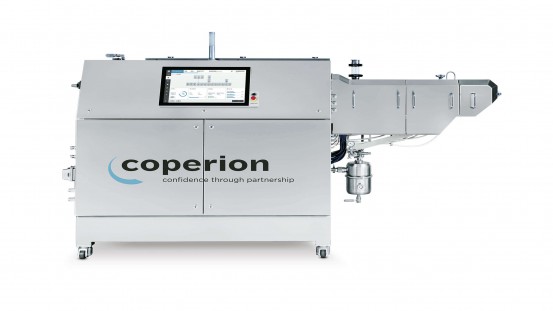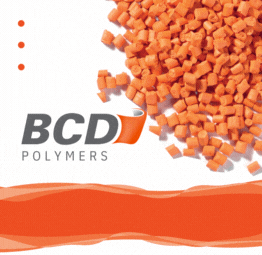With the Coperion extruder, the ZSW can now work on the very latest issues in the production of battery electrodes. In the current manufacturing process for this type of electrodes, the active materials are drawn in a film from a solution of the toxic NMP (N-methyl-2-pyrrolidone) onto a carrier film and then slowly dried in long ovens. In this research project the use of extruders will mean that NMP will not be needed at all in the future. Furthermore, the required drying time will also be drastically reduced and batteries with higher energy content can be produced. The aim of the work being carried out at the ZSW is to design a complete industrial process chain, from the component feeder to direct transmission of the extrudate onto a collector film in a roll-to-roll process.
Dust proof and integrated components for a safe production process
The new developments on the extruder include an encased gearbox lantern, which is also dust proof to prevent the escape of toxic substances. It is also purged with nitrogen so that there is no risk of a dust explosion. The two-circuit cooling system, which uses water to ensure cooling of both the process section and the motor, is now completely integrated into the extruder base frame. The vacuum pump is also housed there. Both units are easily accessible via doors on the rear of the extruder base. The extruder is also designed in compliance with stringent explosion protection regulations and features an enclosed stainless steel design, which can be cleaned very quickly and easily.
The machine is equipped with two Coperion K-Tron loss-in-weight feeders. The K3-PH series feeders are ideally suited for highly accurate, reliable delivery of even the most difficult flowing or toxic ingredients, which is often the case in manufacturing of electrode compounds. These feeders stand out with a state-of-the-art sealing design that is optimally attuned to the high demands of battery applications.
On account of the often abrasive and sometimes corrosive properties of the raw materials being processed, the parts of the Coperion extruders that come into contact with the product are made of material combinations offering exceptionally high resistance to wear and corrosion protection. This means that contamination of the end product due to detached metal particles can be avoided in the long term, even when processing high-wearing raw materials in conjunction with corrosive solvents.
Flexible handling for various research purposes
Designed for flexible research purposes, the extruder with 18 mm screw diameter can achieve throughput rates of 1 to 5 kg/h depending on the application. The ZSK 18 MEGAlab features a broad viscosity range of 500-20,000mPas for the production of battery compounds. To cover this broad viscosity range, Coperion has supplied a second, fully assembled pair of screw shafts, allowing quick and easy replacement. The modular design of the process section is also highly flexible. A twin screw side feeder and various feed options for adding liquid components can be flexibly added to the process section, depending on specific process requirements. Another special feature of the extruder is its integrated torque measurement, which enables very accurate evaluation of the torque directly on the drive chain. In addition, this enables conclusions to be drawn about the properties of the battery masses, enabling a high-quality result to be achieved.
The K3 loss-in-weight feeders are also ideally designed for flexibility in production processes. The stepper motor features an extended feed range (1:500), allowing one feeder to cover a wider range of feed rates. At the same time, the ‘quick change’ modular design means that the feeder bowl can be quickly decoupled from the feeder drive to provide for easy and fast reconfiguration of the line and cleaning of the feeder.
For maximum flexibility in the development of battery compounds, the wide sheet die at the discharge of the extruder can be adjusted to any coating thickness from 0.2-1.5 mm. This increases the flexibility for further downstream applications in research.



